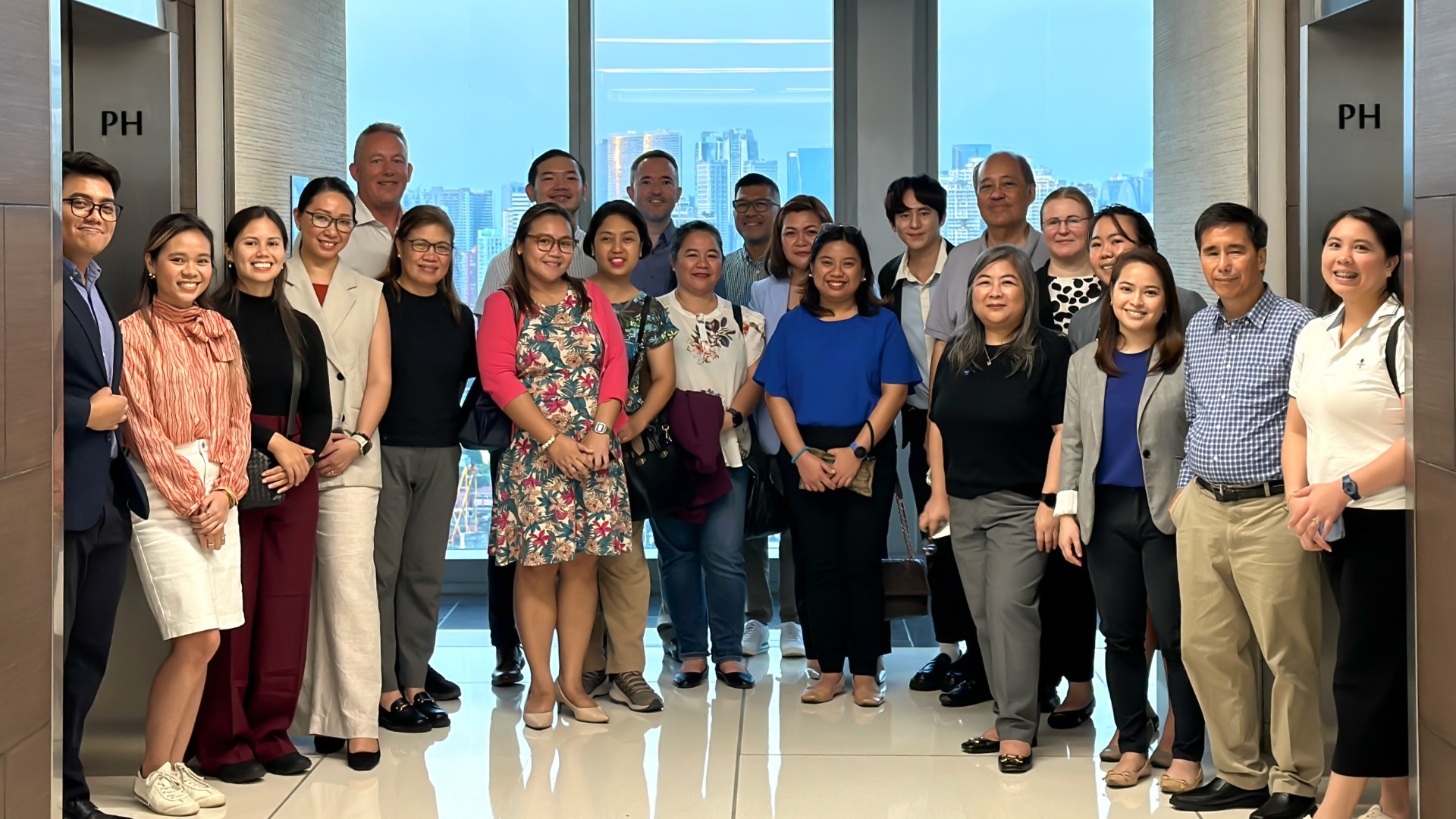“There is really no time to waste. This is the time to act”—Insights from the Sustainability Committee Meeting for April

On 24 April 2024, NordCham Philippines hosted its Sustainability Committee Meeting, focusing on the topic of European Union’s Sustainability Standards. The meeting provided participants with valuable insight into how businesses and organizations in the Philippines can align with these standards and how doing so can impact and benefit the business community.
The two speakers for this month’s meeting include Katrina F. Francisco, Partner at SGV & Co. Philippines and Jennifer A. Pham, Regional Advisor on Sustainability & Supply Chains at the Danish Embassy in ASEAN.
The event was attended by representatives from various companies and businesses including Artelia Philippines, Inc., Asiance Sdn Bhd, BDO Unibank Inc., CGI (Philippines) Inc., National ICT Confederation of the Philippines, Odfjell Technology Corporation, Plastic Bank Philippines, Rider Lovett Bucknall Philippines Inc., Royal Danish Embassy Manila, SM Investments Corporation, SN Aboitiz Power Group, and University of the Philippines-Diliman.
SESSION 1: NAVIGATING EU REGULATIONS ON SUSTAINABILITY
The first session started with a virtual discussion live from Vietnam by Jennifer A. Pham, Regional Advisor on Sustainability & Supply Chains at the Danish Embassy in ASEAN focusing on how the European Union’s regulations on sustainability affect Nordic and Philippine businesses.
At the start of her discussion, she shed light on the importance of ESG (Environmental, social, and governance). In terms of environmental impact, she highlighted the operations and products on the natural environment and the ways that business could help such as reducing carbon emissions, conserving energy and water, using renewable resources, and on the importance of implementing waste management and recycling practices.
In terms of social responsibility, she tackled the relationship of companies to their employees, customers, communities, and other stakeholders in ensuring a fair labor practice, promoting diversity and inclusion, supporting human rights, fostering safe working conditions, and the need to invest in community development initiatives.
Lastly, she briefly discussed the importance of structures, policies, and practices, that govern operations and decision-making process that maintains a transparent and accountable leadership, enforcing ethical business practices and effective risk management systems.
In urging businesses to embrace EU sustainability standards, Jennifer Pham highlights the urgency of the moment. “There really is no time to waste. If you wanna make sure that you are on top, with the new standards. This is the time to act.”–Statements from Jennifer Pham as she stressed the importance of why businesses and companies should know how to assess, navigate, and comply with EU sustainability standards.
With regulatory changes like the Corporate Sustainability Reporting Directive (CSRD) and European Sustainability Reporting Standards (ESRS) now in effect, there's no time to waste. Jennifer pointed out that compliance isn't just about meeting legal obligations; it's about staying competitive. Transparent reporting builds trust, enhances reputation, and identifies areas for improvement. Pham believes that by assessing, navigating, and complying with EU sustainability standards, companies can position themselves for long-term success.
OECD DUE DILIGENCE GUIDANCE FOR RESPONSIBLE BUSINESS CONDUCT
As part of her presentation, Jennifer also tackled the OECD (Organisation for Economic Co-operation and Development) Due Diligence Guidance for Responsible Business Conduct which provides practical support to enterprises on the implementation of the OECD Guidelines for Multinational Enterprises by providing explanations of its due diligence recommendations and associated provisions.
As emphasized by Jennifer, implementing these recommendations can help enterprises avoid and address adverse impacts related to workers, human rights, the environment, consumers and corporate governance that may be associated with their operations, supply chains and other business relationships.
IMPACT TO NORDIC AND PHILIPPINE BUSINESSES
To summarize the discussion, increasing sustainability due diligence requirements pose both challenges and opportunities for Nordic companies operating in the Philippines. By prioritizing transparency, embracing sustainable practices, fostering collaboration with stakeholders, and leveraging sustainability as a competitive advantage, companies can navigate the complexities of the sustainability landscape and emerge as business leaders. Jennifer believes that as the global community strives towards a more sustainable future, Nordic or companies in the Philippines can lead by example, driving positive change and creating shared value for all stakeholders involved.
SESSION 2: DIVING DEEP INTO CSRD AND ESRS
The second session started with a presentation by Katrina F. Francisco, Partner at SGV & Co. Philippines who joined us on-site where she gave further inputs and insights on topics about Corporate Sustainability Reporting Directive (CSRD) and EU Sustainability Reporting Standards (ESRS).
In her discussion, Katrina provided a comprehensive overview, starting with the definition of the Corporate Sustainability Reporting Directive (CSRD) as a legislative measure contributing to the EU green deal's broader sustainability agenda. This directive formalizes reporting requirements for Environmental, Social, and Governance (ESG) factors, setting a new standard for transparency and accountability in business operations.
She emphasized the significance of understanding and complying with these standards, as they represent a fundamental shift in how companies approach sustainability reporting. By embracing the CSRD, businesses not only fulfill regulatory obligations but also align themselves with evolving consumer expectations and investor demands.
Furthermore, Katrina highlighted the practical implications of the CSRD, such as the establishment of reporting standards, audit obligations, and the requirement for digital submission to public authorities. These measures aim to streamline reporting processes, enhance data accuracy, and promote consistency in sustainability disclosures across industries.
WHAT IS ESRS IN A NUTSHELL?
Following her discussion, Katrina moved to introduce what the European Sustainability Reporting Standards (ESRS) entail. These standards set out requirements that undertakings must comply with when preparing and presenting sustainability-related information under the Accounting Directive, as amended by the Corporate Sustainability Reporting Directive (CSRD). The ESRS framework provides companies with clear guidelines for reporting on environmental, social, and governance (ESG) factors, ensuring consistency in sustainability disclosures across the European Union.
CSRD VS. ESRS
It's important to note the distinction between the CSRD and ESRS. While the CSRD focuses on formalizing reporting requirements and establishing regulatory obligations for companies, the ESRS provides the specific standards and guidelines for how companies should prepare and present their sustainability-related information. In essence, the CSRD sets the overarching framework, while the ESRS fills in the details, ensuring uniformity and coherence in sustainability reporting practices across the EU. By understanding and adhering to both sets of requirements, companies can navigate the complexities of sustainability reporting with clarity and confidence, ultimately fostering sustainable business practices.
In conclusion, Katrina believes that proactive action is crucial in navigating the complexities of these standards. She believes that embracing these measures and standards is not just a regulatory obligation but a strategic advantage for businesses to thrive in an ever-evolving business landscape where sustainability is prioritized.
After the presentation concluded, the speakers interacted with the attendees during a Q&A session. Subsequently, the participants engaged in a facilitated brainstorming activity, jotting down their key takeaways about the topic about EU Sustainability Standards:
BELOW ARE SOME KEY TAKEAWAYS FROM THE PARTICIPANTS:
- EU Sustainability Regulations opens doors to the EU market
- It can create and expand opportunities for Philippine businesses.
- Businesses complying with the standards can attract investors
- Compliance helps mitigate risks related to environmental and social issues
- EU regulations drive innovation in Philippine businesses
- Embracing these regulations promotes the long-term business sustainability
ABOUT THE EVENT
The NordCham Sustainability Committee aims for more collaboration across industries and learning opportunities from experts in the field of sustainability. Since April 2022, the Sustainability Committee has hosted 22 meetings on varying sustainability topics with resource speakers and sharing of best practices, networking opportunities and partnerships, and collaboration with government units.
The next Sustainability Committee meeting will be held on May 29, 2024, with a topic focused on SETTING SMART SUSTAINABILITY GOALS. Stay tuned to our website and social media postings for more information.
